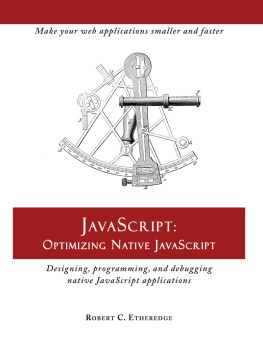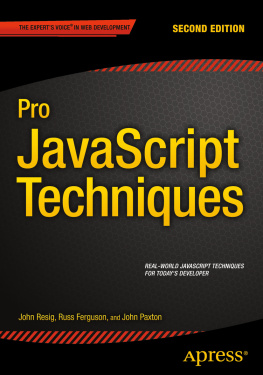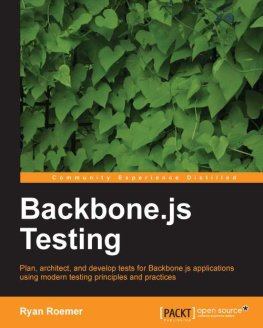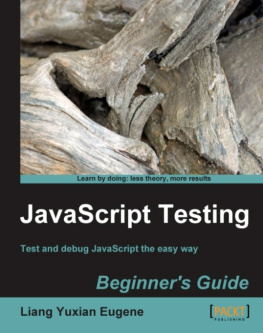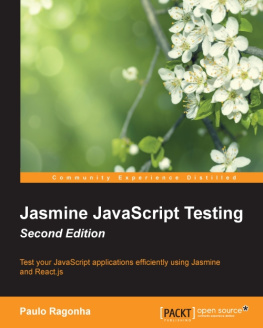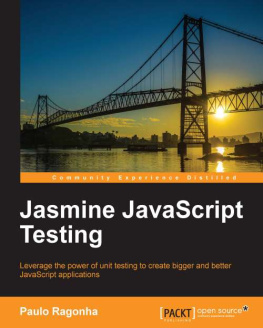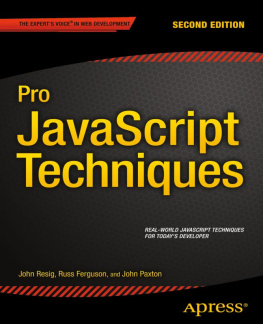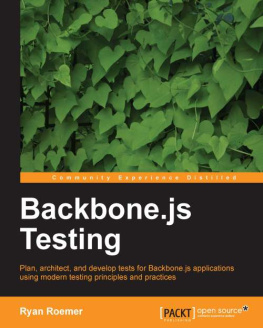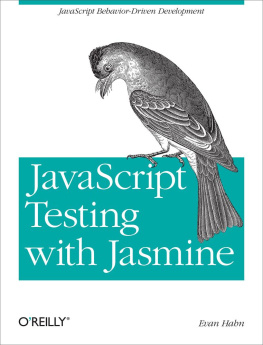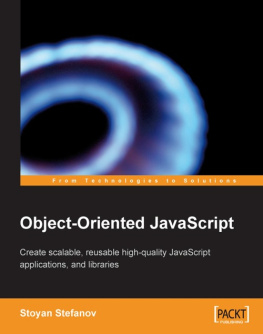Lucas da Costa - Testing JavaScript Applications
Here you can read online Lucas da Costa - Testing JavaScript Applications full text of the book (entire story) in english for free. Download pdf and epub, get meaning, cover and reviews about this ebook. year: 2021, publisher: Manning Publications Co. LLC, genre: Computer. Description of the work, (preface) as well as reviews are available. Best literature library LitArk.com created for fans of good reading and offers a wide selection of genres:
Romance novel
Science fiction
Adventure
Detective
Science
History
Home and family
Prose
Art
Politics
Computer
Non-fiction
Religion
Business
Children
Humor
Choose a favorite category and find really read worthwhile books. Enjoy immersion in the world of imagination, feel the emotions of the characters or learn something new for yourself, make an fascinating discovery.
- Book:Testing JavaScript Applications
- Author:
- Publisher:Manning Publications Co. LLC
- Genre:
- Year:2021
- Rating:3 / 5
- Favourites:Add to favourites
- Your mark:
- 60
- 1
- 2
- 3
- 4
- 5
Testing JavaScript Applications: summary, description and annotation
We offer to read an annotation, description, summary or preface (depends on what the author of the book "Testing JavaScript Applications" wrote himself). If you haven't found the necessary information about the book — write in the comments, we will try to find it.
Testing JavaScript Applications — read online for free the complete book (whole text) full work
Below is the text of the book, divided by pages. System saving the place of the last page read, allows you to conveniently read the book "Testing JavaScript Applications" online for free, without having to search again every time where you left off. Put a bookmark, and you can go to the page where you finished reading at any time.
Font size:
Interval:
Bookmark:
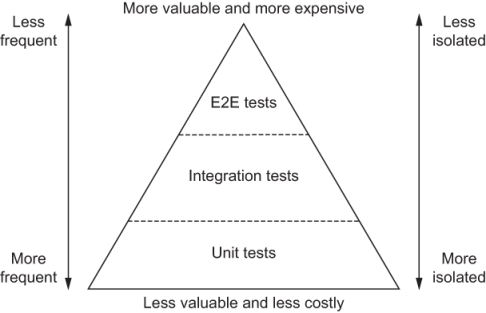

Lucas da Costa
To comment go to liveBook

Manning
Shelter Island
For more information on this and other Manning titles go to
www.manning.com
For online information and ordering of these and other Manning books, please visit www.manning.com. The publisher offers discounts on these books when ordered in quantity.
For more information, please contact
Special Sales Department
Manning Publications Co.
20 Baldwin Road
PO Box 761
Shelter Island, NY 11964
Email: orders@manning.com
2021 by Manning Publications Co. All rights reserved.
No part of this publication may be reproduced, stored in a retrieval system, or transmitted, in any form or by means electronic, mechanical, photocopying, or otherwise, without prior written permission of the publisher.
Many of the designations used by manufacturers and sellers to distinguish their products are claimed as trademarks. Where those designations appear in the book, and Manning Publications was aware of a trademark claim, the designations have been printed in initial caps or all caps.
Recognizing the importance of preserving what has been written, it is Mannings policy to have the books we publish printed on acid-free paper, and we exert our best efforts to that end. Recognizing also our responsibility to conserve the resources of our planet, Manning books are printed on paper that is at least 15 percent recycled and processed without the use of elemental chlorine.
| Manning Publications Co. 20 Baldwin Road Technical PO Box 761 Shelter Island, NY 11964 |
Development editor: | Helen Stergius |
Technical development editor: | Dennis Sellinger |
Review editor: | Mihaela Batini |
Production editor: | Lori Weidert |
Copy editor: | Pamela Hunt |
Proofreader: | Keri Hales |
Technical proofreader: | Srihari Sridharan |
Typesetter and cover designer: | Marija Tudor |
ISBN: 9781617297915
In memory of my grandmother, Marli Teixeira da Costa, who always did everything she could for me to succeed.
Testing JavaScript Applications is the testing book I wish I had read six years ago. At that time, I was a quality assurance (QA) intern. It was my first experience in the software industry. Unfortunately, it didnt require me to do what I liked the most: casting spells on a keyboard. Instead, I had to manually go through screens, click buttons, fill forms, and make sure that the software we built was working as it should.
There must be a better way, I thought. So I started crafting incantations of my own for machines to do the drudgery, liberating me to be the creative wizard I wanted to become.
After 18 months, I thought I had figured most of it out. By then, I had automated myself out of my QA role and become a software engineer.
Once I started writing applications, even more questions popped up in my mind. Having been into QA for a significant amount of time, I didnt want to depend on others to build software that works. I also didnt want to spend my precious spell-crafting time clicking buttons and filling forms, as I used to do.
Once again, I thought that there must be a better way. Thats when I started reading more about software testing. Now that I had access to the source code, I discovered that I could build software more confidently, in less time. Furthermore, I could liberate my QA friends to perform more creative and proactive work instead of just throwing software over the wall for them to test manually.
The tricky part was finding material that would teach me how to do it. Even though I could sometimes find helpful articles online, most of them were out of date or focused on a small part of the testing puzzle.
Putting those pieces together was the most challenging part of learning about software testing. Should software engineers always write tests? If so, which types of tests, for what, and how many? How do software development and QA fit together?
Years ago, there wasnt a single piece of content that could answer all these questions. The book I wanted to read didnt exist; therefore, I decided to write it myself.
While good content is scattered all over the internet, much of it remains unwritten. A big part of the testing puzzle remains unstructured in the brains of those who maintain the testing libraries that others use.
In Testing JavaScript Applications, I put those pieces together in a comprehensible manner. I combined what Ive learned from many years of reading and practical work experience with what Ive discovered while maintaining the testing libraries that millions of people use, like Chai and Sinon.
I firmly believe that excellent testing practices are at the core of every successful piece of software out there. These practices help people write better software, in less time, for fewer dollars. Most importantly, they extricate us humans from drudgery and give us time to do what we do best: create software, which, to me, is still pretty much like magic.
My moms alarm clock has always gone off before 6:00 a.m., just like mine. If it wasnt for her, I dont know how I couldve written the 500 pages youre about to read, most of which Ive written while the world was asleep. My mom taught me the value of discipline and hard work, and Im very thankful for that.
Like her, many other people deserve my gratitude for the lessons they taught me and the help they gave me.
Among those people, the first ones Id like to thank are my family, who cheer for me from the other side of the Atlantic. My father, Herclio, who said hed always support me in whatever Id like to do; my sister, Luiza, the kindest person I know; and my mom, Patrcia, whose hard work Ive praised in the very first paragraph.
In addition to them, I must also thank my grandparents, the ones who took care of me as my parents were working, and, especially my grandmother, Marli Teixeira da Costa, to whom I dedicate this book.
No matter how hard things were back in Brazil, she always did her best for me to have everything I needed for work, from books to computers. During the week, she used to prepare lunch for me and offered me a room in her house next to the university where I could rest so I could pay attention in class.
Besides my family, there are also a few people without whom I wouldnt have been able to complete this work: Douglas Melo and Lorenzo Garibotti, who taught me what friendship really means; Ana Zardo, who showed me the world was bigger than I thought; Alex Monk, my therapist, who helped me navigate change and deal with my frequent existential crises; and Gideon Farrell, who brought me to London and continues to trust me and help me do my best work.
I also cant forget to thank everyone in the JavaScript open source community for everything theyve taught me over the years: Lucas Vieira, whom I met in college and is one of the most talented engineers I know; Carl-Erik Kopseng, who brought me into Sinon.js and with whom I had the pleasure of working in 2017; and Keith Cirkel, who invited me to be a core maintainer of Chai.js, and has always been a supportive friend. He helped me stay afloat when I moved to England three years ago. Im glad the internet has connected me with such amazing people!
Font size:
Interval:
Bookmark:
Similar books «Testing JavaScript Applications»
Look at similar books to Testing JavaScript Applications. We have selected literature similar in name and meaning in the hope of providing readers with more options to find new, interesting, not yet read works.
Discussion, reviews of the book Testing JavaScript Applications and just readers' own opinions. Leave your comments, write what you think about the work, its meaning or the main characters. Specify what exactly you liked and what you didn't like, and why you think so.

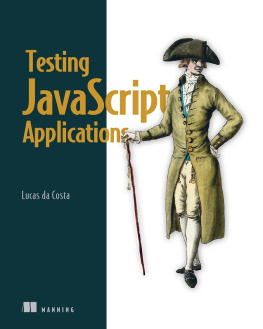

![RachelLeach - Developing Backbone.js applications: [building better JavaScript applications]](/uploads/posts/book/229199/thumbs/rachelleach-developing-backbone-js-applications.jpg)
